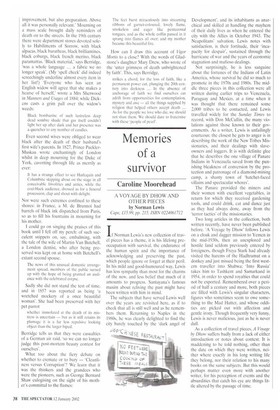Memories of a survivor
Caroline Moorehead
A VOYAGE BY DHOW AND OTHER PIECES by Norman Lewis Cape, £15.99, pp. 215, ISBN 0224061712 If Norman Lewis's new collection of travel pieces has a theme, it is his lifelong preoccupation with survival, the endurance of the human spirit and the importance of acknowledging and preserving the past, which people ignore or forget at their peril. In his mild and good-humoured way, Lewis has less sympathy than most for the charms of the new, and less belief that much of it amounts to progress. Santayana's famous maxim about reliving the past might have been written with him in mind.
The subjects that have served Lewis well over the years are revisited here, as if to check that all is still well and as he remembers them. Returning to Naples in the 1980s, he was clearly delighted to find the city barely touched by the 'dark angel of Development', and its inhabitants as anarchical and skilled at handling the mayhem of their daily lives as when he entered the city with the Allies in October 1943. The Neapolitans' salvation, Lewis notes with satisfaction, is their fortitude, their 'incapacity for despair', sustained through the hurricane of war and the years of economic stagnation and mafioso dealings.
Not surprisingly, he is less sanguine about the fortunes of the Indians of Latin America, whose survival he did so much to promote in the 1970s and 1980s. The middle three pieces in this collection were all written during earlier trips to Venezuela, Paraguay and Mexico, at a time when it was thought that there remained some 2,000 tribes to be contacted, and Lewis travelled widely for the Sunday Times to record, with Don McCullin, the many violations against those known to their governments. As a writer, Lewis is unfailingly courteous: the closest he gets to anger is in describing the work of the New Tribes Missionaries, and their dealings with slaveowners and loggers. It is with definite glee that he describes the one village of Panare Indians in Venezuela saved from the punishing bleakness of conversion by the protection and patronage of a diamond-mining camp, a shanty town of 'hatchet-faced villains and spectacular whores'.
The Panare provided the miners and their women with excellent vegetables, in return for which they received gardening tools, and could drink, eat and dance just as they had always done, away from the 'terror tactics' of the missionaries.
Two long articles in the collection, both written recently, have never been published before. 'A Voyage by Dhow' follows Lewis on a cloak and dagger mission to Yemen in the mid-1930s, then an unexplored and hostile land seldom previously entered by foreigners, though Freya Stark had already visited the harems of the Hadhramut on a donkey and just missed being the first western traveller into Shabwa; 'Into Russia' takes him to Tashkent and Samarkand in 1954, in order to spend royalties that could not be exported. Remembered over a period of half a century and more, both pieces are filled with Lewis's singular characters, figures who sometimes seem to owe something to the Mad Hatter, and whose oddities are picked out with affection and gentle irony. Though frequently very funny, Lewis is never malicious, just as he is never dull.
As a collection of travel pieces, A Voyage by Dhow suffers badly from a lack of either introduction or notes about context. It is maddening to be told nothing, other than the date on which they were written, neither where exactly in his long writing life they belong, nor their relation to his many books on the same subjects. But this would perhaps matter even more with another writer, for his perception of events and the absurdities that catch his eye are things little altered by the passage of time.


























































 Previous page
Previous page